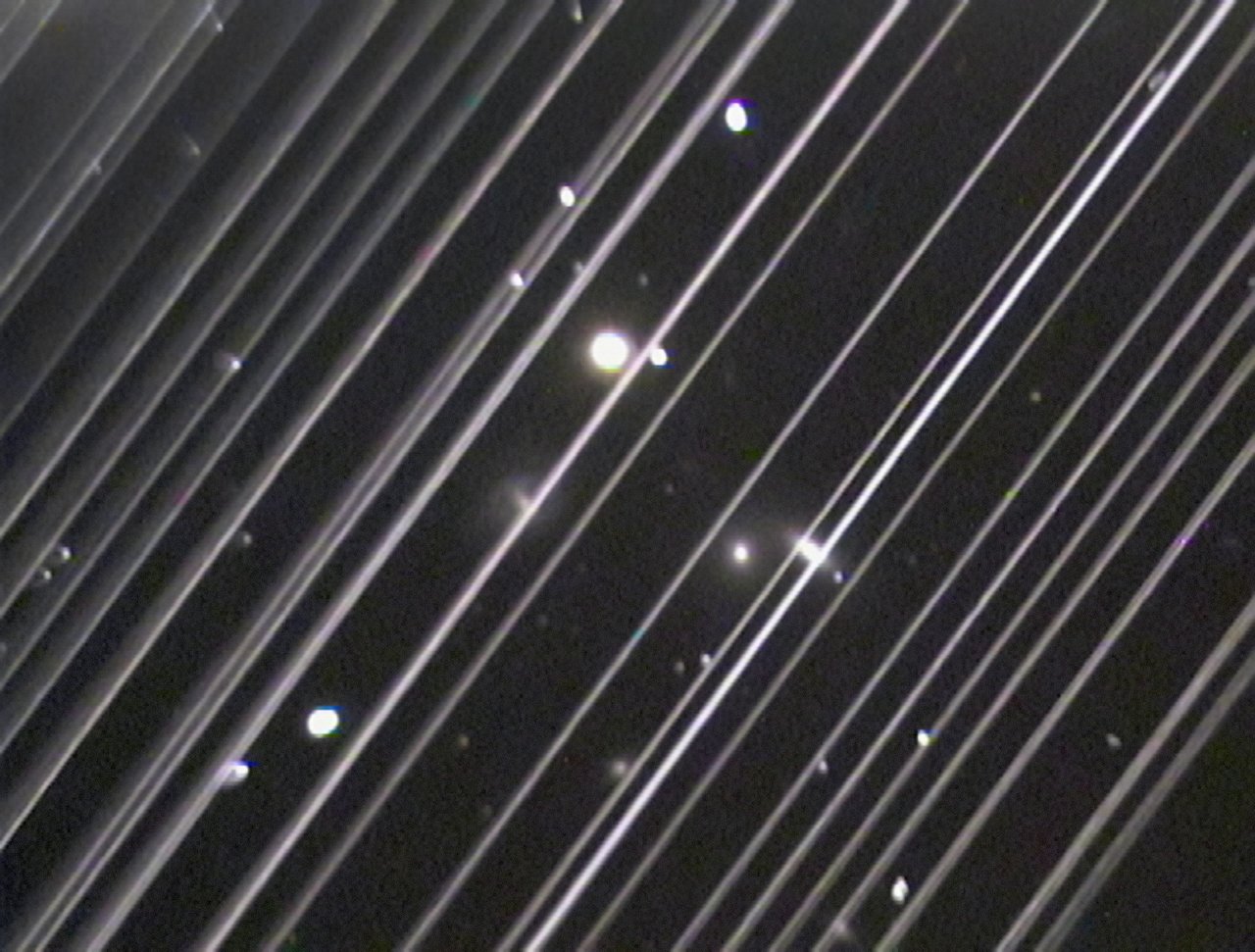Astronomy Group Says Starlink and Other Satellite Constellations Could Threaten Science
Twinkle, twinkle, little satellite ...

The International Astronomical Union (IAU) is voicing concerns about the risk that SpaceX's Starlink and other planned massive satellite constellations in low Earth orbit pose to astronomy.
The group, most famous for its role in "demoting" Pluto from the rank of planet, represents more than 13,000 astronomers worldwide. In its statement, released yesterday (June 3), the IAU pointed out that while there are several megaconstellations under development, no one knows quite what consequences such huge numbers of low Earth orbit satellites could have on astronomy.
"The organisation, in general, embraces the principle of a dark and radio-quiet sky as not only essential to advancing our understanding of the Universe of which we are a part, but also as a resource for all humanity and for the protection of nocturnal wildlife," the statement reads. "We do not yet understand the impact of thousands of these visible satellites scattered across the night sky and despite their good intentions, these satellite constellations may threaten both."
Related: SpaceX's 1st Starlink Internet Satellite Megaconstellation Launch in Photos!
The IAU was prompted to release its statement by astronomers' outcry about the high post-launch visibility of the first 60 Starlink satellites, which SpaceX deployed on May 23. (SpaceX's Starlink satellites will become less visible as they settle into their permanent orbits.) SpaceX CEO Elon Musk dismissed these concerns on Twitter on May 27, but the outcry has continued.
The statement is careful to note that it isn't just SpaceX's Starlink that poses a threat to astronomy. The existing Iridium constellation, as well as the in-progress OneWeb and existing Globalstar internet networks are also cited in the statement, as are Amazon's recently announced Project Kuiper satellite internet and the Athena internet satellite that Facebook was suspected to be working on last summer.
The IAU's concern with each of these projects is the sheer number of satellites each requires in low Earth orbit. To date, there have been fewer than 200 such satellites, according to the statement, but the IAU worries that number could reach five digits. And taken together, all of those satellites could threaten two key types of astronomy.
Breaking space news, the latest updates on rocket launches, skywatching events and more!
First, optical astronomy. Each individual satellite reflects light, and while most of these reflections are too faint for casual skywatchers to see, astronomers rely on much more sensitive optical telescopes. Particularly at risk from megaconstellations will be supersensitive optical telescopes and those designed to survey the whole sky rapidly, according to the IAU.
And these satellites threaten radio astronomy as well, the organization writes. The constellations will communicate with Earth via radio signals, and astronomers working in radio wavelengths already struggle to ignore all of the human chatter that relies on this type of communication. The IAU specifically calls out the Event Horizon Telescope's imaging of a black hole as the sort of project that could be affected by megaconstellations.
"Although significant effort has been put into mitigating the problems with the different satellite constellations, we strongly recommend that all stakeholders in this new and largely unregulated frontier of space utilisation work collaboratively to their mutual advantage," the IAU statement reads. "Satellite constellations can pose a significant or debilitating threat to important existing and future astronomical infrastructures, and we urge their designers and deployers as well as policy-makers to work with the astronomical community in a concerted effort to analyse and understand the impact of satellite constellations."
- 'Losing the Dark': Video Illuminates Threat of Light Pollution
- Spectacular Time-Lapse Video Shows Wonders of the Night Sky
- Hawaii Night Sky Revealed in Stunning New Video
Email Meghan Bartels at mbartels@space.com or follow her @meghanbartels. Follow us on Twitter @Spacedotcom and on Facebook.

Meghan is a senior writer at Space.com and has more than five years' experience as a science journalist based in New York City. She joined Space.com in July 2018, with previous writing published in outlets including Newsweek and Audubon. Meghan earned an MA in science journalism from New York University and a BA in classics from Georgetown University, and in her free time she enjoys reading and visiting museums. Follow her on Twitter at @meghanbartels.
